第39章
The rest were players or lookers-on; most of whom, by well-known gradations of curiosity and weakness, to describe which minutely would be to write a little comedy that others have already written, were drawn into playing at last. So fidgets the moth about the candle before he makes up what, no doubt, the poor little soul calls his mind.
Our little party stopped first at _trente et quarante,_ and Zoe commenced her observations. Instead of the wild excitement she had heard of, there was a subdued air, a forced quiet, especially among the seated players. Astern etiquette presided, and the gamblers shrouded themselves in well-bred stoicism--losing without open distress or ire, winning without open exultation. The old hands, especially, began play with a padlock on the tongue and a mask upon the face. There are masks, however, that do not hide the eye; and Miss Vizard caught some flashes that escaped the masks even then at the commencement of the play. Still, external stoicism prevailed, on the whole, and had a fixed example in the _tailleur_ and the croupiers. Playing many hours every day in the year but Good-Friday, and always with other people's money, these men had parted with passion, and almost with sensation; they had become skillful automata, chanting a stave, and raking up or scattering hay-cocks of gold, which to them were counters.
It was with the monotonous voice of an automaton they intoned:
"Faites le jeu, messieu, messieu."
Then, after a pause of ten seconds:
"Le jeu est fait, messien."
Then, after two seconds:
"Rien ne va plus."
Then mumble--mumble--mumble.
Then, "La' Rouge perd et couleur," or whatever might be the result.
Then the croupiers first raked in the players' losses with vast expedition; next, the croupiers in charge of the funds chucked the precise amount of the winnings on to each stake with unerring dexterity and the indifference of machines; and the chant recommenced, "Faites le jeu, messieu."Pause, ten seconds.
"Le jeu est fait, messieu.
Pause, two seconds.
"Rien ne va plus."
The _tailleur_ dealt, and the croupier intoned, "La'! Rouge gagne et couleur perd:" the mechanical raking and dexterous chucking followed.
This, with a low buzzing, and the deadened jingle of gold upon green cloth, and the light grating of the croupiers' rakes, was the first impression upon Zoe's senses; but the mere game did not monopolize her attention many seconds. There were other things better worth noting: the great varieties of human type that a single passion had brought together in a small German town. Her ear was regaled with such a polyglot murmur as she had read of in Genesis, but had never witnessed before.
Here were the sharp Tuscan and the mellow Roman; the sibilation of England, the brogue of Ireland, the shibboleth of the Minories, the twang of certain American States, the guttural expectoration of Germany, the nasal emphasis of France, and even the modulated Hindoostanee, and the sonorous Spanish, all mingling.
The types of face were as various as the tongues.
Here were the green-eyed Tartar, the black-eyed Italian, and the gray-eyed Saxon; faces all cheek-bones, and faces no cheek-bones; the red Arabian, the fair Dane, and the dark Hindoo.
Her woman's eye seized another phenomenon--the hands. Not nations only, but varieties of the animal kingdom were represented. Here were the white hands of fair women, and the red paws of obese shop-keepers, and the yellow, bird-like claws of old withered gamesters, all stretched out, side by side, in strange contrast, to place the stakes or scratch in the winnings; and often the winners put their palms or paws on their heap of gold, just as a dog does on a bone when other dogs are nigh.
But what Zoe's eye rested on longest were the costume and deportment of the ladies. A few were in good taste; others aimed at a greater variety of beautiful colors than the fair have, up to this date, succeeded in combining, without inflicting more pain on the beholders than a beneficent Creator--so far as we can judge by his own system of color--intended the cultivated eye to suffer. Example--as the old writers used to say--one lady fired the air in primrose satin, with red-velvet trimming. This mild mixture re-appeared on her head in a primrose hat with a red feather. A gold chain, so big that it would have done for a felon instead of a fool, encircled her neck, and was weighted with innumerable lockets, which in size and inventive taste resembled a poached egg, and betrayed the insular goldsmith. A train three yards long completed this gorgeous figure. She had commenced life a shrimp-girl, and pushed a dredge before her, instead of pulling a silken besom after her.
Another stately queen (with an "a") heated the atmosphere with a burnous of that color the French call _flamme d'enfer,_ and cooled it with a green bonnet. A third appeared to have been struck with the beauty of a painter's palette, and the skill with which its colors mix before the brush spoils them. Green body, violet skirts, rose-colored trimmings, purple sleeves, light green boots, lavender gloves. A shawl all gauze and gold, flounced like a petticoat; a bonnet so small, and red feather so enormous and all-predominant, that a peacock seemed to be sitting on a hedge sparrow's nest.
Zoe suspected these polychromatic ladies at a glance, and observed their manners, in a mistrustful spirit, carefully. She was little surprised, though a good deal shocked, to find that some of them seemed familiar, and almost jocular, with the croupiers; and that, although they did not talk loud, being kept in order by the general etiquette, they rustled and fidgeted and played in a devil-may-care sort of manner. This was in great measure accounted for by the circumstance that they were losing other people's money: at all events, they often turned their heads over their shoulders, and applied for fresh funds to their male companions.